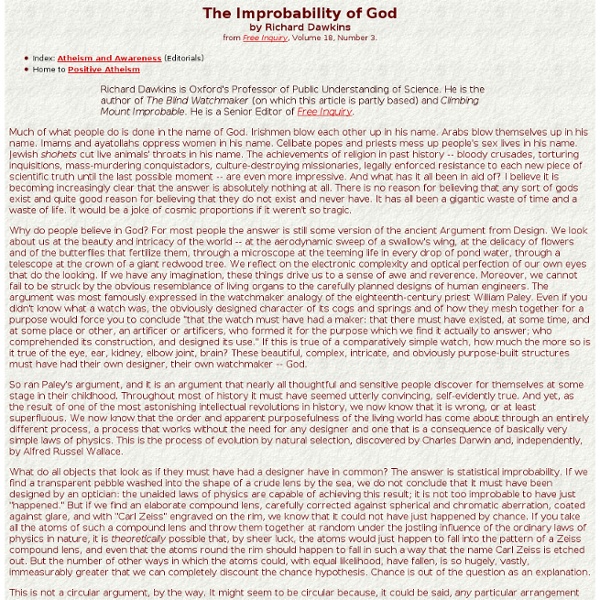Brief Anthropological Approach to the Study of Religion
Anthropological studies of religion have long constituted some of the most important thinking in the development of religious studies as a field; to some extent, all major theorists of religion can be considered "anthropological" because they all in some way seek to compare and understand "religious" phenomena of various cultures. The anthropology of religion has often centered on those sociocultural elements that are frequently identified as religious: myths, rituals, magic, beliefs about gods and divine beings, taboos, and symbols. Introducing the Anthropology of ReligionThe history and theory of a number of movements in the anthropology of religion—including the theories of Marx, Freud, Weber, and Durkheim—are detailed in Brian Morris’s Anthropological Studies of Religion: An Introductory Text.
Why Atheism?
Just about everyone is an atheist when it comes to other gods — the gods that other people believe in or that nobody believes in anymore. I’m an atheist about all gods because there's no reliable evidence for any god, or even for Jesus. There is also extensive evidence that Jesus and all gods are fictional characters — myths created mainly by people who had little understanding of how our universe operates. We all like myths and other stories, but we don't have to believe them.
How to Promote Atheism With Almost No Effort
So you think atheism is worthwhile, do you? You'd like to see more people abandon religious delusion and embrace reality, huh? You'd even like to see atheism become the norm in your country, wouldn't you? Okay, prove it.
Does Hell Exist
You are here: Worldviews >> Does Hell Exist Does Hell Exist - What does the Old Testament say? Does Hell exist? A proper biblical worldview includes a belief in a real, eternal, and physical hell. What do you believe?
50 Atheist Quotes - Born Again Pagan
50 Atheist Quotes George Carlin 1.
My favorite quotes
original source here Celeberty atheistsFamous dead non-theistsThe Thomas Paine Library This is a collection of some of my favorite quotes, I will be adding to it as I find more of them. Quotes from:
Atheism Central for Secondary School Students - Home page
Why be an atheist? Letter to an atheist Why believe in God? NEW! The platypus and the theoaphonist
Jesus and Hell : Interfaith
Benevolent God did not create Hell. There is no Hell in a literal sense, at least not as a physical place of dwelling full of fire and brimstone and torture – as the lasting mediaeval imagery would have us believe. Hell requires a closer scrutiny of the garbled Greek influences riding upon Jewish philosophy to determine its inferred meaning. Sheol is the word used throughout the Old Testament that is usually translated as “Hell”, but the word itself relates simply to death and the grave – or perhaps more precisely, a grave-pit – that’s where the notion of Hell being “beneath” – a form of underworld – comes from – bodies are buried beneath us within the earth, and conjoined with the primal notion of Heaven and God being literally among or above “the heavens”. Yet even death is not seen as separation from YHWH: cf Job 11:8, 26:6, Jonah 2:2.
Born believers: How your brain creates God
From New Scientist magazine 04 February 2009 by Michael Brooks Read our related editorial:The credit crunch could be a boon for irrational belief. WHILE many institutions collapsed during the Great Depression that began in 1929, one kind did rather well.
The Spirited Atheist: Atheists know more about religion than the religious - On Faith at washingtonpost.com
Why is anyone surprised at the findings of a new survey of American religious knowledge, released last week by the Pew Forum, which demonstrate that atheists and agnostics know more about religion than the religious do? The only religious groups comparable to atheists in general religious knowledge are Jews and Mormons. Atheists even know more about Christianity than American Christians. I find this totally predictable, because most atheists today (this may not be true a generation from now) were raised in some religious tradition and found it wanting.
Atheist Fundamentalists
I am prothelsized to constantly by atheist friends, both on Facebook and in my life, things I never do – I am told that they are doing this as some form of protest for equality. Yet, these very same people take offense to anyone putting up anything religious on their Facebook page.I had an atheist friend say to me he was insulted and angry that religious people/colleagues no longer wanted to talk or debate with him – when his intent in his own words ‘was to tear them a new a-hole!’ Sounds like you need new ‘friends.’ And your friend who is “insulted” by a lack of debate sounds like he might be a jerk. Or, he’s just very outspoken, likely about non-theistically-oriented things as well?
A. J. Ayer "Language Truth Logic and God," 1946
Language, Truth, Logic, and God The following excerpt was published in Language Truth and Logic (1946). by A. J.



